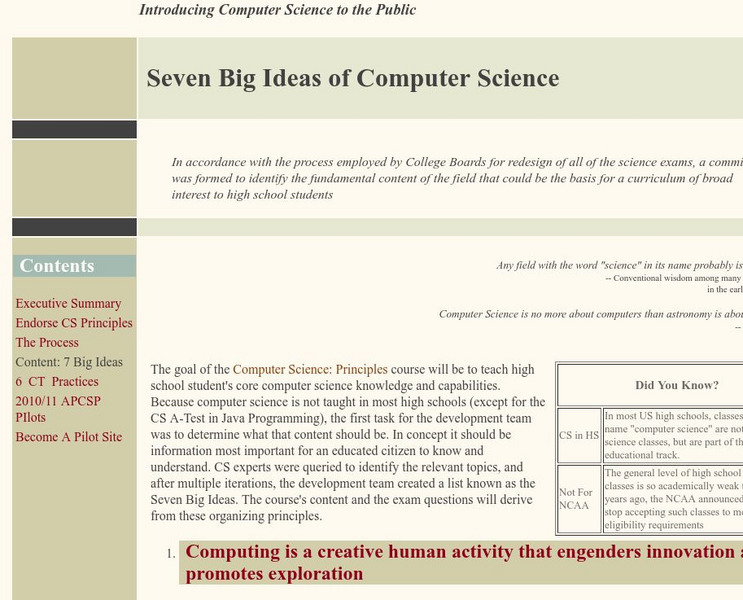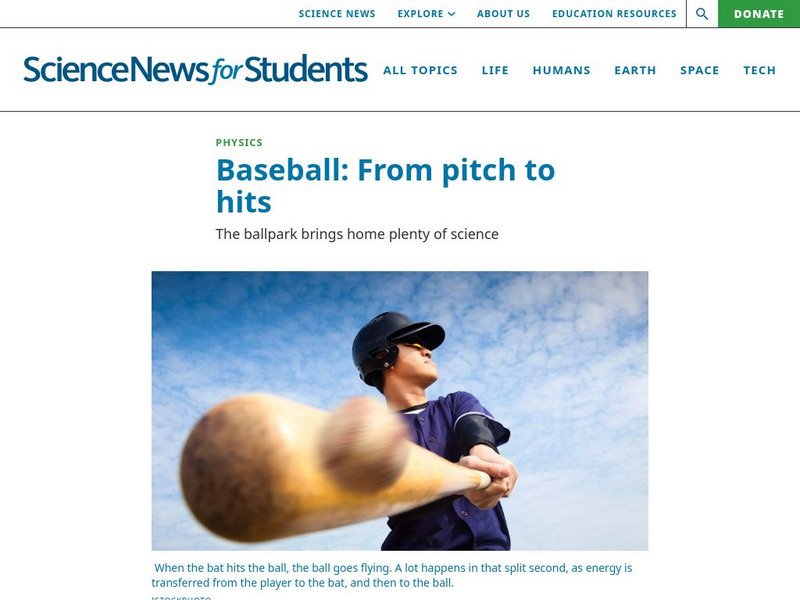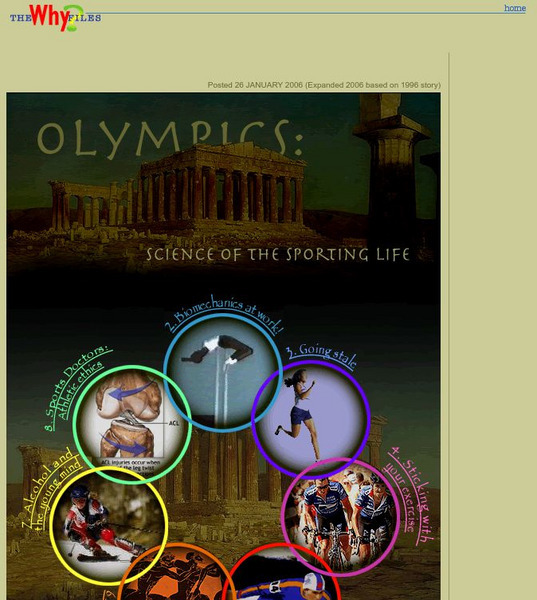NASA
Catch a Gravitational Wave, Dude!
It is cowabunga time! Pupils read an article about the NASA LISA mission on gravitational waves and conduct additional research on them. The class participates in a science bowl type competition about gravitational waves. Panels of four...
NASA
From Smoke Signals to Cell Phones: Tracing How Technologies Evolve
Explore the science of space exploration. Pupils consider technological advances in propulsion, communication, power, navigation, and imaging. They select one of these areas and create a timeline of historical progress that contributed...
NASA
Water Works on a Blue Planet
Keep within a water budget. Learners find out that less than 2.5% of Earth's water is available to drink—and that there is a fixed amount of water. Scholars read an interesting article comparing the available water to a game of Monopoly...
NASA
Speaking in Phases
Hear from deep space. Pupils learn how satellites transfer information back to Earth. They learn about three different ways to modulate radio waves and how a satellite sends information with only 0s and 1s. Using sound, class members...
NASA
Blinded by the Light!
Pupils learn of multiple ways astronomers look for planets outside of the solar system. By completing a hands-on activity, scholars discover that trying to see the planets directly because of the glare from the nearby star is nearly...
NASA
Write the Book on Weather Metrics
It's not easy to measure the weather. Pupils learn about what all weather has in common—the atmosphere. Scholars discover how a meteorologists must be able to measure aspects of the atmosphere and decipher the data. They then create a...
NASA
Taking Apart the Light
Break down light into spectra. Scholars learn how atoms emit and absorb photons and come to understand how this process allows scientists to identify different atoms based on either absorption lines or emission lines. Learners then...
NASA
Packing for a L-o-o-o-ng Trip to Mars
Pack just enough to fit. Crews determine what personal items to take with them on a trip to Mars. Each team must decide what to take with them on a two-and-a-half year trip to Mars and whether their items will fit within the allotted...
NASA
Taking a Cold, Clear Look at the Universe
Take a look with another perspective. Pupils read to find out what portion of the electromagnetic spectrum a space telescope sees and the difficulties of viewing infrared radiation from other objects in space. Individuals discover how...
NASA
Keeping Nine Eyes on the Weather
Take a look at climate change from another angle. Readers learn about the MISR instrument on the Terra satellite and how it studies Earth. Pupils experience how the multiple cameras give scientists multiple views so they can better study...
NASA
Chasing Down a Satellite
Calculate the speed of the International Space Station. By reading the article, pupils learn about the concept of orbits. Scholars work through a formula to determine how fast the International Space Station is traveling to stay in...
NASA
Mapping the Watery Hills and Dales
How does GPS know where everything is located? Pupils read about satellites that are mapping the ocean and the question on how satellites know where they are. Readers discover the workings of the Global Positioning System and create...
Other
National Institute of Building Sciences: Whole Building Design Guide: Building Science Concepts
This resource page is the first of a series on relevant topics in building science. It is aimed at explaining the key concepts involved in building science, as well as the relationship of this discipline to the architecture / engineering...
Smithsonian Institution
Smithsonian: Science: Week of 4 22 13: Intriguing Science Art
View images of beautiful scientific art and read the captions to learn what the images portray. These images are from a contest called the Cool Science Image contest.
University of Oregon
University of Oregon: Greek Science: Early Cosmology
Discusses the evolution of ideas about the cosmos, from the Magic Cosmology of the Neolithic age to the stage of Mythical Cosmology, to the Geometric Cosmology of the ancient Greeks. The third stage advocated a rational approach to...
Other
Exploring Computer Science: Computational Thinking [Pdf]
The head of the Computer Science Department at Carnegie Mellon University, Jeannette M. Wing, discusses the importance of addressing computational thinking with young learners.
University of Washington
University of Washington: Cs: Seven Big Ideas of Computer Science
An overview of the seven fundamental principles which make up the content of computer science.
National Museum of Science and Industry (UK)
Nmsi: Ingenious: Dumbing Down Science
The 21st-century culture of scientific discovery has become more and more dependent on the support of the public. Television has done science a great service by moving it from an isolated institution to a more public celebration....
Society for Science and the Public
Science News for Students: Baseball: From Pitch to Hits
This article explains some of the science behind baseball. Also includes a list of vocabulary words from the article.
University of Florida
University of Florida: Episodes in Romantic Science
One of the "Episodes in Romantic Science," this is as complete as a biography gets without being a book. Includes great information about Oersted and his electromagnetic work, The definitive source. Heavily footnoted with many additional...
Society for Science and the Public
Science News for Students: Concussion: More Than 'Getting Your Bell Rung'
This article explains the science of concussions, including the damage they can do to the brain and symptoms of concussion. The article also describes the technology that scientists are using to detect concussion and how helmets are now...
Society for Science and the Public
Science News for Students: 3 D Printers Offer Better Way to Make Some Magnets
Oak Ridge National Laboratory in Tennessee has been working on a way to cut back expenses on powerful magnets used in various objects we use every day like computers and cars. Science News for Students probes into the investigation's...
University of Wisconsin
The Why Files: Olympics: Science of the Sporting Life
When the Winter Olympics begin we can study the science of sports: biomechanics, figure skating, high jumping, mental preparation, alcohol and athletes, sports doctors, staleness, and training in the ancient Olympics.
Other
Pre History of Cognitive Science: Robert Burton: The Anatomy of Melancholy 1621
This site tells of Robert Burton's ideas and opinions on Cognitive Science; the site helps explain Robert Burton's "Anatomy of Melancholy."
Other popular searches
- Earth Science
- Physical Science
- Life Science
- Science Project
- Science Space
- Environment Science
- History of Science
- Environmental Science
- Pe Science
- Family and Consumer Science
- Consumer Science
- Social Science
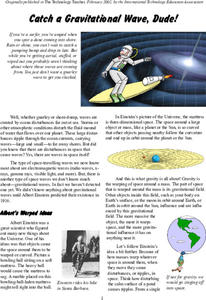
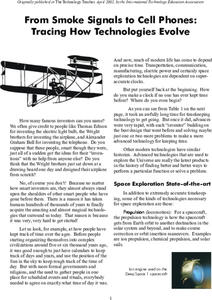








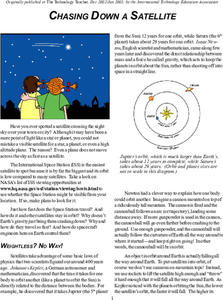




![Exploring Computer Science: Computational Thinking [Pdf] Article Exploring Computer Science: Computational Thinking [Pdf] Article](https://d15y2dacu3jp90.cloudfront.net/images/attachment_defaults/resource/large/FPO-knovation.png)
